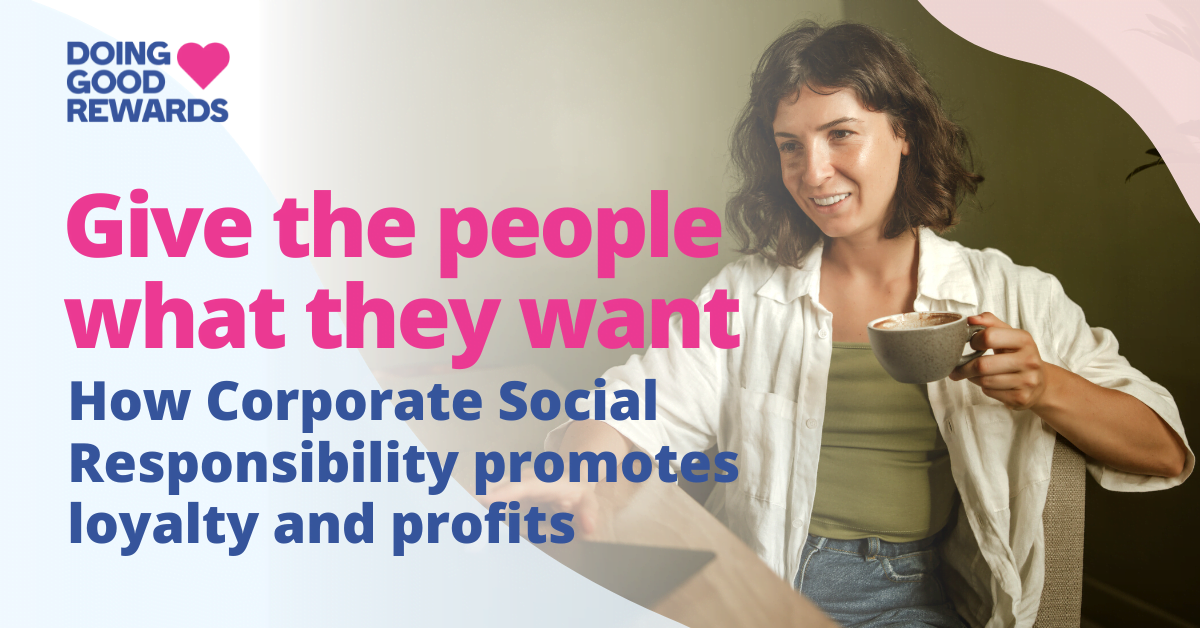
Give the people what they want: How Corporate Social Responsibility promotes loyalty and profits
Once upon a time, back in the noughties, Corporate Social Responsibility (CSR) was still seen as something of a novelty. While the concept was robust enough, many businesses needed to see some sort of ‘proof’ before biting the bullet.
Even proponents, convinced that it was a good thing, still looked for evidence to back up their belief.
Others watched on, not sure whether they could make it work for their business. They, too, needed some facts and figures to convince them that it was worth doing. After all, not everyone is prepared to take a risk and potentially get it wrong.
Of course, things have turned 180 degrees over the past decade or so. Now, rather than those businesses with CSR programs being the exceptions, it’s those without one that have become the odd ones out!
What has driven the rise in CSR?
Like many things in our fast-paced world, it’s people power that’s driven the rise in CSR. When something works, it tends to catch on relatively quickly.
For most things business-related, that equates to consumers ‘voting’ with their dollars.
If anything was holding back a wider take-up of CSR across the business world it was a lack of clarity about exactly what constitutes a CSR initiative, how to construct an effective CSR program, and how best to communicate those activities and their purpose.
As CSR has become more clearly defined, it has become not only better understood by consumers, but also more highly valued by everyone from investors, through boards and management, to retail and customer service staff and, ultimately, customers.
If something is demonstrably providing value to consumers, it must be valuable to anyone interested in doing business with them.
The findings have been consistent
Over the past 15 years, we’ve seen hundreds of studies into CSR and how consumers respond to it.
More than ten years ago* we were told:
“The way in which CSR manifests itself determines consumer support. CSR can provide three forms of value to consumers: emotional, social, and functional. Each of these enhances or diminishes the overall value proposition for consumers. Further, value created by one form of CSR can either enhance or diminish other product attributes.”
The key points that were made back when CSR was just taking hold have been reinforced time and again over the past decade and still hold true.
CSR isn’t a one-size-fits-all proposition, but rather includes a range of activities that each add value to consumers in different ways, as does combining different initiatives into a more comprehensive program.
Importantly, any CSR activities must be a good fit for the business and its core products or services.
What’s in it for businesses?
Understanding consumer behaviour is a vital part of running any business.
While its importance is magnified for billion-dollar corporations that need to keep increasing profits to satisfy shareholders, even the family-owned corner store benefits from giving the people what they want.
Firstly, you want to get people to buy from you rather than a competitor. You can make your proposition more attractive in a number of ways – price point, service, presentation, rewards, value-adds – and if you can make yours a clear business of choice, that brand differentiation is invaluable.
Secondly, once you have managed to ‘acquire’ someone’s custom, you want to keep them coming back again and again. Satisfying and therefore retaining existing customers costs less (and delivers a more predictable cashflow) than churning through one-off transactions and constantly chasing new business.
In fact, it would be fair to say that customer loyalty is the ultimate prize that every business is chasing.
The rise of ethical consumerism
Most people want to think of themselves as good citizens, so it’s only natural that they will feel drawn to businesses that they feel are good corporate citizens.
However, over recent years, we’ve started to see a rise in consciously ethical consumerism, where people actively seek out products and services produced in a way that minimises social and/or environmental damage, while avoiding products and services deemed to have a negative impact on society or the environment.
As ethical consumerism has grown, it has started to have an impact on the way businesses operate by encouraging innovative products and companies.
Whereas people have long been known to modify their spending behaviour based on a company’s CSR position, ethical consumers take it a step further by actively promoting ‘good’ businesses.
That’s something that’s even more valuable than customer loyalty: advocacy.
Word-of-mouth from their peers is the most authentic and valuable endorsement of your business. You (or your marketing team) can say whatever you like about your own business, but it will never carry the same weight as customers telling others to buy from you.
That’s how CSR will help deliver new customers, turn them into repeat customers, and increase your profits.
We can help you set up a CSR program that goes so much further than just corporate philanthropy. Book an initial consultation with us today and discover how to transform CSR from a cost centre to a profit centre for your business.
*Quote from the summary of How does corporate social responsibility create value for consumers?, published in the Journal of Consumer Marketing on January 25th 2011.
Recent Posts
- 4 Tips For Communicating Your Social Impact
- Changemaker Consumers: 2023 Trends All Brands Need to Know
- Put your holiday spending to great use this holiday season!
- Stop just giving money to charity and go ‘full CSR’ with purpose
- The right way to promote and profit from your Corporate Social Responsibility credentials
Categories
Click here to email us & we’ll contact you to send more info
Click here to book a 15 min Zoom meeting to find out more
What would you like to do?

Stay ahead of the trends and the competition
Download Free PDF

